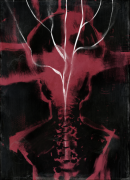|
We've all got favorite authors and novels. I think it's also fair to say that anybody who reads with any frequency has particular segments within novels that they love, whether because of a particular mood that's evoked, a certain turn of phrase, or a mind-blowing plot development. This thread is for all of us to chronicle our favorite book-chunks, be they chapters, pages, or just paragraphs. Feel free to say what it is you like about something, too. I'll start: - The Triumph of Death from Underworld-- Underworld is a great work, but it (somewhat unfortunately) peaks within the first 50 or so pages. But what pages they are. The chapter is told from the point of view of a variety of observers (including J. Edgar Hoover) at the famed 1951 Dodgers/Giants Pennant game. It's fantastically written, and there's something almost mystical in the way it captures the mingled hope and terror that characterized the beginning of the Cold War. - The chapter about farm evictions from The Grapes of Wrath-- Occurs early in the book, and doesn't have a lot to do with the main plot, but it portrays the callousness and inhumanity of corporate capitalism in plain, but searing language. - The last chapter of the Great Gatsby-- This is probably where literature peaked. It's super sad and super beautiful. - The Red Wedding chapter from a Storm of Swords-- Yeah, this is a goony pick, but gently caress you. It's definitive.
|
|
|
|

|
| # ? May 6, 2024 20:26 |
|
Oh, and Henry IV act II scene iv, where Falstaff role-plays king Henry and tells Hal hilarious lies about the army of bandits in "buckram suits."
|
|
|
|
That bit in that one book I like: YOu know the one. That other bit in a different book: Oh yeahh that's the poo poo.
|
|
|
|
CestMoi posted:That bit in that one book I like: YOu know the one. You're right about the first one. Except that other bit sucks. So trite.
|
|
|
|
In Black Lamb and Grey Falcon by Rebecca West, there is a brilliant passage about how Franz Ferdinand essentially created his own fate. It starts with a discussion about how the Archduke was a famed hunter, not so much for his skill but simply sheer volume of woodland creatures he was able to kill. He accomplished this by hiring a number of "beaters" who would go out into the woods and by making noise flush the animals towards him, at which point he would shoot them. This was of course a common practice, but apparently the Archduke had come up with some particular formula or positioning for these beaters that allowed him to kill the animals with surprising efficiency. West then describes how, point by point, both Ferdinand's alienation from the rest of the Habsburg court and his attitude and action towards Slavic independence movements in the Balkans was setting up a set of these "beaters" which then drove him irreversibly into the situation which resulted his own assassination. It's a rather long passage that goes through each blunder or "beater" at a time and expounds in it, but extremely well done and one of the more unique descriptions of some of the underlying causes of the first World War, or at least the tensions which sparked the initial conflict between Austria and Serbia. Falstaff Infection posted:- The last chapter of the Great Gatsby-- This is probably where literature peaked
|
|
|
William Faulkner posted:My mother is a fish.
|
|
|
|
|
Earwicker posted:In Black Lamb and Grey Falcon by Rebecca West, there is a brilliant passage about how Franz Ferdinand essentially created his own fate. Never read anything by Rebecca West, but now she's on my list! Anything else of hers that's worth checking out? Is Black Lamb and Grey Falcon the best place to start? (and I was being like 90% facetious about literature peaking with TGG. I actually find it kind of middling most of the way through, I just really love that last chapter.) Falstaff Infection fucked around with this message at 23:45 on Dec 7, 2014 |
|
|
|
Falstaff Infection posted:Never read anything by Rebecca West, but now she's on my list! Anything else of hers that's worth checking out? Is Black Lamb or Grey Falcon the bet place to start? It's the only thing by her I've read so far. I loved it, but it's also very long and if you aren't interested in Balkan history it's probably not for you, but if you are interested in it, it's fascinating. She's a very great and insightful writer. On top of that, the book largely follows her travels through Yugoslavia in 1937. So, only a few years after the book was written, Germany invaded, nearly destroyed Serbia, set up a puppet state in Croatia, etc. but at the time the book was written, no one knew this was about to happen. There is a lot of tension of course, but she and her husband still encounter German tourists on various trains and boats etc. who are just there on vacation, the Croats and Serbs and Bosniaks that she hangs around with are clearly somewhat cross with one another about various pieces of history, but not in such a way that it looks like war is right around the corner. Everyday life is still normal (mostly) all over the country, and it's very unnerving to look at this very detailed portrait of a land living its daily routines with this huge unknown destruction right around the corner. Earwicker fucked around with this message at 23:54 on Dec 7, 2014 |
|
|
|
It's not exactly (or at all) high literature, but I love the prose in the opening of The Scar by China Miéville. People often think he uses obscure words just for the sake of using obscure words, but those four pages of undersea scenery set the mood for the book perfectly and I reread them a couple times whenever I pick the book up. Right, now I'll take my plebiean SF out of the place.
|
|
|
|
|
Here is a sentence by James Joyce that I like a lot, from Portrait of the Artist as Young Man:James Joyce posted:Glimmering and trembling, trembling and unfolding, a breaking light, an opening flower, it spread in endless succession to itself, breaking in full crimson and unfolding and fading to palest rose, leaf by leaf and wave of light by wave of light, flooding all the heavens with its soft flushes, every flush deeper than the other.
|
|
|
|
anilEhilated posted:It's not exactly (or at all) high literature, but I love the prose in the opening of The Scar by China Miéville. People often think he uses obscure words just for the sake of using obscure words, but those four pages of undersea scenery set the mood for the book perfectly and I reread them a couple times whenever I pick the book up. poo poo, that reminds me! The chapter in Kraken which describes the strike of the familiars union is genius. It's a perfect example of Mieville's ability to come up with crazy, unique fantasy concepts. He also lets his Trot flag fly freely in that one, which I love. Shame I found the rest of the book kind of overstuffed. It ended up feeling like he had all these great ideas and concepts but hadn't thought a great deal about how to tie them all together in a coherent plot.
|
|
|
|
Falstaff Infection posted:Oh, and Henry IV act II scene iv, where Falstaff role-plays king Henry and tells Hal hilarious lies about the army of bandits in "buckram suits." They aren't role-playing at that point, but that bit of back and forth is still hilarious. Also, at the end of the role-play when Hal says "I do, I will". drat. drat.
|
|
|
|
Blind Sally posted:They aren't role-playing at that point, but that bit of back and forth is still hilarious. Also, at the end of the role-play when Hal says "I do, I will". drat. Yeah, I know those are two separate exchanges, but they're both in the same scene. My wording was kinda muddled though. And yeah, "I do, I will," is some cold poo poo. I saw a production of Henry IV once in Barnsdale park (Los Angeles) and everybody was sort of amateurish except the dude who played Hal. He looked a little bit like Alan Cumming, and the way he said that line gave me chills.
|
|
|
|
The scene in One Hundred Years of Solitude where Fernanda rants at Aureliano Segundo for three pages in one long, unbroken sentence, and he goes berserk and smashes all her flowerpots, is probably my favourite thing ever written.
|
|
|
|
Genre fiction has a few moments of beauty. Case in point, from Tom Holt; a man is chatting up a woman, when he loses interest in talking to her in favour of listening to himself talking: "The young man hadn't heard her. He was looking through her, as if she were a ghost, to the distant but irresistible vision of his own cleverness." I LOVE the expression "the distant but irresistible vision of his own cleverness." It's such a perfect summation of someone who started out talking to you and ended up listening to themselves.
|
|
|
|
|
I'm a big fan of good opening lines, a couple of my favourites are: Ian Banks (The Crow Road) - "It was the day my grandmother exploded." Kurt Vonnegut (Slaughterhouse 5) - "Listen: Billy Pilgrim has become unstuck in time." Both address the reader directly, both contain a dramatic action and both lead to further questions. Probably left their two agents with massive grins.
|
|
|
|
Zalakwe posted:I'm a big fan of good opening lines, a couple of my favourites are: Yeah, the Slaughterhouse-Five opening is perfect. I also love closing lines-- the one from Huckleberry Finn is a pretty great one, for example.
|
|
|
|
She turns. "Hold up my fur." He obeys. "Be careful. Don't touch my skin." Earlier in this game she was nervous, constipated, wondering if this was anything like male impotence. But thoughtful Pointsman, anticipating this, has been sending laxative pills with her meals. Now her intestines whine softly, and she feels poo poo begin to slide down and out. He kneels with his arms up holding the rich cape. A dark turd appears out the crevice, out of the absolute darkness between her white buttocks. He spreads his knees, awkwardly, until he can feel the leather of her boots. He leans forward to surround the hot turd with his lips, sucking on it tenderly, licking along its lower side ... he is thinking, he's sorry, he can't help it, thinking of a Negro's penis, yes he knows it abrogates part of the conditions set, but it will not be denied, the image of a brute African who will make him behave. . . . The stink of poo poo floods his nose, gathering him, surrounding. It is the smell of Passchendaele, of the Salient. Mixed with the mud, and the putrefaction of corpses, it was the sovereign smell of their first meeting, and her emblem. The turd slides into his mouth, down to his gullet. He gags, but bravely clamps his teeth shut. Bread that would only have floated in porcelain waters somewhere, unseen, untasted—risen now and baked in the bitter intestinal Oven to bread we know, bread that's light as domestic comfort, secret as death in bed . . . Spasms in his throat continue. The pain is terrible. With his tongue he mashes poo poo against the roof of his mouth and begins to chew, thickly now, the only sound in the room. . . .
|
|
|
|
I loved this passage in Albert Camus' l'étranger, especially the last sentence. A translation I found: quote:Then everything began to reel before my eyes, a fiery gust came from the sea, while the sky The original (which I read) is of course better and makes more sense. quote:Cette épée brûlante rongeait mes cils et fouillait mes yeux douloureux. C'est alors que tout a vacillé. La mer a charrié un I also like the passage with the last rites of Bokononism in Cat's Cradle. (you can find the rites here: http://www.cs.uni.edu/~wallingf/personal/bokonon.html#alsobybokonon)
|
|
|
|
Nitevision posted:She turns. "Hold up my fur." He obeys. "Be careful. Don't touch my skin." Earlier in this game she was nervous, constipated, wondering if this was anything like male impotence. But thoughtful Pointsman, anticipating this, has been sending laxative pills with her meals. Now her intestines whine softly, and she feels poo poo begin to slide down and out. He kneels with his arms up holding the rich cape. A dark turd appears out the crevice, out of the absolute darkness between her white buttocks. He spreads his knees, awkwardly, until he can feel the leather of her boots. He leans forward to surround the hot turd with his lips, sucking on it tenderly, licking along its lower side ... he is thinking, he's sorry, he can't help it, thinking of a Negro's penis, yes he knows it abrogates part of the conditions set, but it will not be denied, the image of a brute African who will make him behave. . . . The stink of poo poo floods his nose, gathering him, surrounding. It is the smell of Passchendaele, of the Salient. Mixed with the mud, and the putrefaction of corpses, it was the sovereign smell of their first meeting, and her emblem. The turd slides into his mouth, down to his gullet. He gags, but bravely clamps his teeth shut. Bread that would only have floated in porcelain waters somewhere, unseen, untasted—risen now and baked in the bitter intestinal Oven to bread we know, bread that's light as domestic comfort, secret as death in bed . . . Spasms in his throat continue. The pain is terrible. With his tongue he mashes poo poo against the roof of his mouth and begins to chew, thickly now, the only sound in the room. . . . Yikes. Maybe I should start a "Favorite Coprophagia in Literature" thread? It could have this, 120 Days of Sodom, Hogg (sweet jesus is that book upsetting.)
|
|
|
|
"He never cried, not even in his dreams, for hard-heartedness was a point of pride. A large iron anchor withstanding the corrosion of the sea and scornful of the barnacles and oysters that harass the hulls of ships, sinking polished and indifferent through heaps of broken glass, toothless combs, bottle caps, and prophylactics into the mud at harbour bottom – that was how he liked to imagine his heart. Someday he would have an anchor tattooed on his chest."
|
|
|
|
Zalakwe posted:I'm a big fan of good opening lines, a couple of my favourites are: "The man in black fled across the desert, and the gunslinger followed."
|
|
|
|
Gene Wolfe, The Citadel of the Autarch posted:What struck me on the beach–and it struck me indeed, so that I staggered as at a blow–was that if the Eternal Principle had rested in that curved thorn I had carried about my neck across so many leagues, and if it now rested in the new thorn (perhaps the same thorn) I had only now put there, then it might rest in everything, in every thorn in every bush, in every drop of water in the sea. The thorn was a sacred Claw because all thorns were sacred Claws; the sand in my boots was sacred sand because it came from a beach of sacred sand. The cenobites treasured up the relics of the sannyasins because the sannyasins had approached the Pancreator. But everything had approached and even touched the Pancreator, because everything had dropped from his hand. Everything was a relic. All the world was a relic. I drew off my boots, that had traveled with me so far, and threw them into the waves that I might not walk shod on holy ground.
|
|
|
|
The in-story bit where Dahl interacts with Jenkins' wife and the third coda in Redshirts. Those parts are just so... nice, beautiful even, and a great and surprising contrast to the sheer fun and wackiness of the rest of the book.
|
|
|
|
Shibawanko posted:"He never cried, not even in his dreams, for hard-heartedness was a point of pride. A large iron anchor withstanding the corrosion of the sea and scornful of the barnacles and oysters that harass the hulls of ships, sinking polished and indifferent through heaps of broken glass, toothless combs, bottle caps, and prophylactics into the mud at harbour bottom – that was how he liked to imagine his heart. Someday he would have an anchor tattooed on his chest." What's this from?
|
|
|
|
Falstaff Infection posted:What's this from? Ooh, oooh, I recognize this one! It's from The Sailor Who Fell From Grace With the Sea by Yukio Mishima.
|
|
|
|
Antony's speech in Julius Caesar.quote:Friends, Romans, countrymen, lend me your ears; And this little poem from Journey to the West. quote:Excellent, truly excellent, Jive One fucked around with this message at 05:28 on Dec 10, 2014 |
|
|
|
The razing of Pachigam from Shalimar the Clown, where a peaceful Kashmiri village that serves as the main setting for like 3/4's of the novel finally gets set upon by the Indian army. The woman mentioned in the passage is the title character's mother. Fun times!quote:Who lit that fire? Who burned that orchard? Who shot those brothers who laughed their whole lives long? Who killed the sarpanch? Who broke his hands? Who broke his arms? Who broke his ancient neck? Who shackled those men? Who made those men disappear? Who shot those boys? Who shot those girls? Who smashed that house? Who smashed that house? Who smashed that house? Who killed that youth? Who clubbed that grandmother? Who knifed that aunt? Who broke that old man's nose? Who broke that young girl's heart? Who killed the lover? Who shot his fiancee? Who burned the costumes? Who broke the swords? Who burned the library? Who burned the saffron field? Who burned the beehives? Who poisoned the paddies? Who killed the children? Who whipped the parents? Who raped that lazy-eyed woman? Who raped that lazy-eyed woman as she screamed about snake vengeance? Who raped that woman again? Who raped that woman again? Who raped that woman again? Who raped that dead woman? Who raped that dead woman again? Oxxidation fucked around with this message at 06:12 on Dec 10, 2014 |
|
|
|
Khizan posted:"The man in black fled across the desert, and the gunslinger followed." The sad thing about that brilliant opening is that it might just be the highlight of the whole series. For me the Gunslinger was the best novel by a country mile. Although there were other good moments it never quite managed to achieve the same atmosphere again. Oxxidation posted:The razing of Pachigam from Shalimar the Clown, where a peaceful Kashmiri village that serves as the main setting for like 3/4's of the novel finally gets set upon by the Indian army. The woman mentioned in the passage is the title character's mother. Fun times! That's some powerful stuff. Zalakwe fucked around with this message at 15:16 on Dec 11, 2014 |
|
|
|
Jive One posted:Antony's speech in Julius Caesar. JC has never been my favorite Shakespeare, but that's a drat good speech. I love how many different registries Shakespeare can speak in-- he can do sincerity, he can do sophistry, he can do them both at once.
|
|
|
Nitevision posted:She turns. "Hold up my fur." He obeys. "Be careful. Don't touch my skin." Earlier in this game she was nervous, constipated, wondering if this was anything like male impotence. But thoughtful Pointsman, anticipating this, has been sending laxative pills with her meals. Now her intestines whine softly, and she feels poo poo begin to slide down and out. He kneels with his arms up holding the rich cape. A dark turd appears out the crevice, out of the absolute darkness between her white buttocks. He spreads his knees, awkwardly, until he can feel the leather of her boots. He leans forward to surround the hot turd with his lips, sucking on it tenderly, licking along its lower side ... he is thinking, he's sorry, he can't help it, thinking of a Negro's penis, yes he knows it abrogates part of the conditions set, but it will not be denied, the image of a brute African who will make him behave. . . . The stink of poo poo floods his nose, gathering him, surrounding. It is the smell of Passchendaele, of the Salient. Mixed with the mud, and the putrefaction of corpses, it was the sovereign smell of their first meeting, and her emblem. The turd slides into his mouth, down to his gullet. He gags, but bravely clamps his teeth shut. Bread that would only have floated in porcelain waters somewhere, unseen, untasted—risen now and baked in the bitter intestinal Oven to bread we know, bread that's light as domestic comfort, secret as death in bed . . . Spasms in his throat continue. The pain is terrible. With his tongue he mashes poo poo against the roof of his mouth and begins to chew, thickly now, the only sound in the room. . . . Of all the iconic scenes in the greatest postwar novel yet written, you just had to pick that one. Speaking of Pynchon, the part where Mason & Dixon meet the Learn'd English Dog has always stuck with me. The Mechanickal Duck is great, too. He does absurdity as well as anyone ever has.
|
|
|
|
|
From Robert Penn Warren's All the King's Men: “I got an image in my head that never got out. We see a great many things and can remember a great many things, but that is different. We get very few of the true images in our heads of the kind I am talking about, the kind that become more and more vivid for us as if the passage of the years did not obscure their reality but, year by year, drew off another veil to expose a meaning which we had only dimly surmised at first. Very probably the last veil will not be removed, for there are not enough years, but the brightness of the image increases and our conviction increases that the brightness is meaning, or the legend of meaning, and without the image our lives would be nothing except an old piece of film rolled on a spool and thrown into a desk drawer among the unanswered letters.”
|
|
|
|
Falstaff Infection posted:- The last chapter of the Great Gatsby-- This is probably where literature peaked. It's super sad and super beautiful. Well, I wouldn't call it the peak, since that was clearly the Star Wars extended universe novel Vector Prime, but I've always had a fondness for the passage where Nick's quiet fury at Tom dissipates into acceptance. quote:I couldn’t forgive him or like him, but I saw that what he had done was, to him, entirely justified. It was all very careless and confused. They were careless people, Tom and Daisy — they smashed up things and creatures and then retreated back into their money or their vast carelessness, or whatever it was that kept them together, and let other people clean up the mess they had made. . . .
|
|
|
First, a quote from a critical essay I imagine most of you recognize:quote:Even modern fairy-stories can produce this effect sometimes. It is not an easy thing to do; it Then, a sequence of scenes from the Aubrey/Maturin series, involving the relationship between Stephen Maturin, one of the protagonists, a learned physician, and his . . intellectually disabled. . manservant Padeen Colman. He treats Padeen for severe burns with opium, and Padeen becomes addicted and is transported to Australia. Years (?) and oceans later, Stephen is in Australia and thinks to check up on Padeen. quote:‘If he does not object,’ said Stephen, ‘I should very much like to read it, when my mind is at rest. But Martin my mind is not at rest. You know my concern for Padeen.’ * * * * * quote:When they came nearer Dawes Point Redfern’s cheerfulness declined and he said ‘I am ashamed to display this hospital in all its squalid nakedness. Happily Governor and Mrs Macquarie are engaged on a new building.’ As they walked in he said ‘Colman is in the small ward on the right. His back is healing, but there is a dejection of spirits and an utter neglect of food that makes me anxious: I hope your visit may comfort him.’ Years more pass, and Stephen (along with Padeen) returns home to England after a years-long see voyage. Once home, he finds that his wife, Diana, has run away, and left his daughter behind; he meets his daughter for the first time. quote:Clarissa led them slowly, almost as it were reluctantly, quite through its length and then turned right-handed into a carpeted room with candles and a fire. A small girl was building cardhouses on a table near the grate. Later: quote:Stephen rode towards Ashgrove Cottage, sombre from his long and unsuccessful journey to the North Country, sombre from his stop at Barham, where he had heard of Mrs Williams’ barbarity; but with a sombreness shot through and through with a brilliant gleam. In a small square room upstairs at Barham, overlooking the now almost empty stables, Diana had put a good many of his papers and specimens: a dry little room, in which they might be preserved. On the other side of the passage another room, sometimes called-the nursery, held a number of unused dolls, a rocking-horse, hoops, large coloured balls and the like; and as he sat arranging these papers and sheet after sheet of a hortus siccus collected in the East Indies and sent home from Sydney, he heard Padeen’s voice from across the way. Hieronymous Alloy fucked around with this message at 07:21 on Dec 13, 2014 |
|
|
|
|
A Confederacy Of Dunces posted:Abelman’s Dry Goods Falstaff Infection posted:Yikes. Maybe I should start a "Favorite Coprophagia in Literature" thread? It could have this, 120 Days of Sodom, Hogg (sweet jesus is that book upsetting.) Don't forget the "Hassan's Rumpus Room" chapter from Naked Lunch. Juaguocio fucked around with this message at 07:19 on Dec 13, 2014 |
|
|
|
I don't know if it's at my "favorite of all time" level or not, but the "terrible secret of the universe" intro of John Dies at the End is one of my favorite story beginnings; it gives you a good feel for exactly how weird/funny the book is gonna be within paragraphs, grabbed me into the book from the start, and has beautiful resonance with the ending with the whole "is a perfect copy of the original the same as the original?" question. Rest of the prologue is great also of course, but it takes a lot to catch me from the first pages.
|
|
|
|
From the chapter The Author Talks to Himself from War With The Newts by Karel Čapek: Just stop it, will you. I can't work miracles. What has to happen will happen! Things run along their inevitable course. And even that's reassuring in its way: that everything that happens has its own necessity and follows certain rules. "Couldn't the newts be stopped in some way?" No. There are too many of them. They've got to have room to live in. "What about if they all died out in some way? Something like some kind of epidemic or degeneration..." No, that's too cheap and easy. Why should nature have to put right what's been done by man? See?--not even you think they could do anything to save themselves now. You basically think something will come along from somewhere else.
|
|
|
|
Alhazred posted:From the chapter The Author Talks to Himself from War With The Newts by Karel Čapek:
|
|
|
|
|
Oh man, I was laughing out loud in class as I read that Confederacy of Dunces passage. "[Y]ou are in your incomprehensible babble, unable to assimilate stimulating concepts of commerce into your retarded and blighted worldview." Is there any funnier book? My money's on no. I guess Catch-22 has its moments, and Skippy Dies is pretty hilarious.
|
|
|
|

|
| # ? May 6, 2024 20:26 |
|
Little Man, What Now? by Hans Fallada is one of the best novels I've read in the last few years. It was written by Hans Fallada, a German, and first published in 1932. The plot deals with a young couple who get married following an unplanned pregnancy and their attempts to survive in depression era Germany. Part of the novel's appeal is that it deals with Nazism and the culture of late Wiemar Germany from a contemporary standpoint: the Nazis are part of the story, but the story is not written with retrospective knowledge of the rise of the Third Reich. The book also makes it much easier to understand how the depression tore apart the fabric of society to such a degree that regular people were contemplating supporting the Nazis. Anyway there's a scene toward the end where the protagonist, Johannes Pinneberg, who is out of work and cannot provide for his wife and baby, is walking down a boulevard in Berlin. Pinneberg has lost his job as a salesman and is becoming increasingly desperate. He stops in front of a shop window to admire some of the goods being displayed only to have a policeman come up and tell him to move along. He looks at his reflection in the mirror and realizes that he looks like a tramp and that the cop only views him as a miscreant and potential trouble maker. He reaches up and tears off his white collar - a symbol of his former status as a salesman - and is forced to accept that he's no longer a part of the middle class. A little later, in the novel's epilogue, we learn that the still unemployed Pinneberg, now living in an outlying suburb of Berlin filled with other unemployed types, is considering joining the Nazis or the Communists so that he will at least have someone to stand up for him.
|
|
|



































